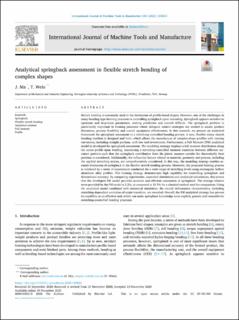| dc.description.abstract | Stretch bending is commonly used in the fabrication of profile-based shapes. However, one of the challenges in many bending-type forming processes is controlling springback upon unloading. Springback appears sensitive to upstream and in-process parameters, making prediction and control difficult. The springback problem is particularly important in forming processes where stringent control strategies are needed to assure product dimension, process flexibility and overall equipment effectiveness. In this research, we present an analytical framework for springback assessment in a stretching-controlled bending process. A new, flexible rotary stretch bending machine is designed and built, which allows the manufacture of complex-shape profiles with varying curvatures, including straight portions, with low tool investments. Furthermore, a Full Moment (FM) analytical model is developed for springback assessment. The modeling strategy employs a full moment distribution along the entire profile upon bending, introducing a stretching-controlled moment transition between different curvature portions such that the springback contribution from the plastic moment outside the theoretically bent portions is considered. Additionally, the influential factors related to material, geometry and process, including the applied stretching strains, are comprehensively considered. In this way, the modeling strategy enables accurate evaluation of springback in the flexible stretch bending process. Moreover, the proposed forming process is validated by a series of experiments conducted for a wide range of stretching levels using rectangular hollow aluminum alloy profiles. This forming strategy demonstrates high capability for controlling springback and dimensional accuracy. By comparing experiments, numerical simulations and analytical calculations, this proves that the developed FM model provides accurate and efficient assessment of springback. The average relative error provided by the FM model is 2.2%, as compared to 10.5% for a classical method used for comparison. Using the analytical model combined with numerical simulation, the crucial deformation characteristics, including stretching-dependent evolution of strain transition, are revealed. Overall, the FM analytical strategy has proven its capability as an effective tool, which can make springback knowledge more explicit, generic and reuseable for stretching-controlled bending processes. | en_US |

